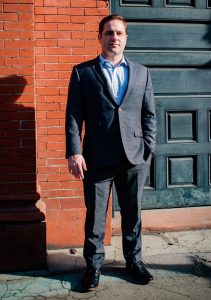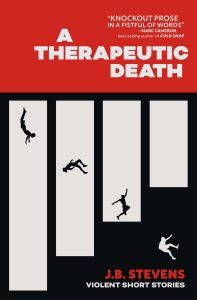It’s been ages since I profiled another writer. Shame on me!
But let’s get that sorted with a special interview. It’s my pleasure to introduce you to a wonderful talent, J.B. Stevens.

J.B. Stevens lives in the Southeastern United States with his wife and daughter. His short story collection A Therapeutic Death was a 2022 release from Shotgun Honey. His pop poetry collection The Best of America Cannot Be Seen is available from Alien Buddha Press.
Stevens was a finalist for the Claymore Award for crime fiction and the Colonel Darron L. Wright award for poetry. He was nominated for the Pushcart Prize for poetry. He won Mystery Tribune’s inaugural micro-fiction contest.
Before his writing career, J.B. was a United States Army Infantry Officer. He served in Iraq and earned a Bronze Star. He is an undefeated Mixed Martial Arts Fighter and a Black Belt in Brazilian Jiujitsu. He graduated from The Citadel.
 J.B.’s latest offering is an anthology of exciting short stories, entitled A Therapeutic Death, published 18 February 2022 by Shotgun Honey Books.
J.B.’s latest offering is an anthology of exciting short stories, entitled A Therapeutic Death, published 18 February 2022 by Shotgun Honey Books.
All of crime fiction’s greatest hits congregate in A Therapeutic Death. This short story collection blends mystery, comedy, true crime, and noir. The pieces are short, fast, and volatile. There is something delicious for every reader to bite into.
The volume opens with “To Keep A Secret,” an Appalachian noir piece. It is reminiscent of the best David Joy work. The story tells of two veterans coming to terms with their mistakes, a decade after their time in Iraq. The ending is heartbreaking in its inevitable climax.
This is followed by “A Well-Lit Path”—the tale of a man framed for murder who is quickly running out of options.
Next up is the mixed-martial-arts focused entry “The Orange Key.” The author’s vast experience in the world of fighting springs to the surface. The prose is authoritative but entertaining as can be.
“The Handprint,” was the winner of Mystery Tribune’s inaugural micro fiction contest, follows. This story is sharp, short, and as violent as you’ve ever read.
Midway through the book is the biting comedy piece “Maybe a Don’t Want to Be Found”—a send-up of The Most Dangerous Game—from the eyes of “Waldo”, the titular character in “Where’s Waldo”.
Next comes “The Bunker” and “The Mortar,” two slower-paced, true, war stories.
“The Mask” is a skin-crawlingly disgusting true crime piece that will leave the reader feeling as if they lost a piece of their innocence.
Bringing the volume home is “The Georgia Queen,” a noir tale that is also a palate-cleansing love letter to 1980s American pop culture.
In addition to the work mentioned above, A Therapeutic Death contains numerous other exciting stories.
A Therapeutic Death is a deep and heartfelt examination of life after war, as well as a page-turningly-fun read. The violence is raw. The comedy is laugh-out-loud funny. The crime is fast and violent.
*****
What other writing have you done, J.B?
If you go to my website (www.jb-stevens.com) you can check out my stuff. I’ve published war fiction, comedy prose, crime fiction, and literary fiction. I have won awards in comedy poetry, war poetry, and fiction. I’m also a prolific reviewer for various websites and I conduct interviews for different crime fiction venues.
I write a lot, and there is something there for most readers
What makes your writing unique compared to others in the genre?
I’m a war veteran, undefeated mixed martial arts fighter. I write from a deep well of experience.
Which is your favorite character and why?
Will McLean from Pat Conroy’s THE LORDS OF DISCIPLINE. He is kind and witty and willing to go against the crowd, while still being tough and physical (when needed).
What are you working on now?
A few different things. My agent has two crime novels that I hope are the beginning of a series. I also have a weird military fiction/romance story that is about 25k words, I have no idea what I’ll do with that one.
What is the most unethical practice in the publishing industry?
There are (unfortunately) many unethical practices. People dream of being writers, and unethical people know how to pray on dreamers. Dreamers are good targets for criminals.
With that said, to focus on one issue, vanity presses. There are vanity publishers that charge unsophisticated people tens of thousands of dollars to “publish” books when self-publishing is basically free (with that said, if self-publish but decide to purchase a professional cover and editing you get what you pay for).
If you are an aspiring writer please remember, money always flows TO the writer. A writer should not be paying for any services unless they seek out that specific service.
For example, if you query an agent and they say, “This is great but you really need an edit. Call my friend XXX, their rates are reasonable.” That is a HUGE red flag.
If you want an editor, find an editor and discuss payment. Anyone that should be making you money, trying to take your money, is a scammer and a bad person.
What are common traps for aspiring writers?
Vanity publishers, shady agents referring people to their paid editing services, paid advertising services that are just money pits.
Does a big ego help or hurt writers?
I know a big ego hurts creative growth. However, a writer must possess an unshakeable belief in the quality of their work. Balancing the two is very hard for some people. A writer needs to be able to accept and absorb constructive criticism, while simultaneously KNOWING they will “make it”.
Internally I have a repeating word loop. “I know my writing isn’t good. I also know that my writing needs to be read, and editors will recognize this fact.”
I know this word loop doesn’t make a ton of sense, but here we are.
What are your favorite literary journals?
Mystery Tribune, The Paris Review, Tough, Mystery Magazine.
What is your favorite childhood book?
I have so many I love. But, if I must pick one, HATCHET by Gary Paulsen. It is a middle-grade novel about wilderness survival, it was life-changing.
What is the most difficult part of your artistic process?
Finding the time and space to create is very challenging. I (like many other authors) have a family and a full-time job. Carving out a quiet minute to think and write can be hard, if not impossible.
Does your family support your career as a writer?
Fortunately, they do. My wife and daughter try their best to give me space to read and write. They sacrifice quality time, and I appreciate their efforts immensely.
*****
It’s been awesome to learn about you as a writer, J.B. Thanks for your time!
You can find out more about J.B. Stevens via the following links.
Website: jb-stevens.com
Goodreads
Twitter
Amazon